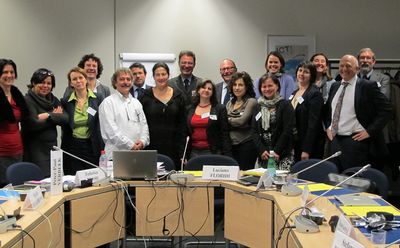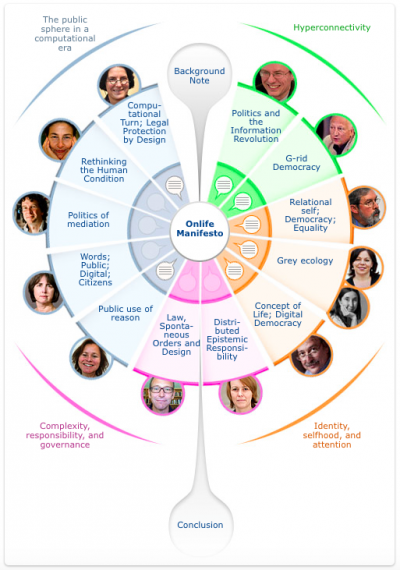The Onlife Initiative
The Onlife Initiative , also known as Concept Re-engineering Think Tank was a project envisioned and implemented directly by the EC's Information Society DG[1]. The project fall under the Digital Futures Task Force initiative of DG Connect of the European Commission and run for the whole of 2012. The project intended to explore the extent to which the digital transition impacts societal expectations towards policy making. Yiannis Laouris participated in the Think Tank, which was composed of 12 international experts plus Dr. Nicole Zwaaneveld [2].
The project outcome was The Onlife Manifesto.
The rapid development and exploitation of digital technologies in all aspects of human life affects radically the human condition. For example, it modifies our relationship to ourselves, to others and to the world. It shakes established reference frameworks, in a number of different domains including (but not restricted to):
- The blurring of the distinction between reality and virtuality;
- The blurring of the distinction between human/machine/nature;
- The reversing from scarcity to abundance, when it comes to information;
- The reversing from the primacy of entities over interactions to the primacy of interactions over entities.
The working of the group is chaired by Prof. Luciano Floridi [3]. Person in charge from the EC is Nicole Zwaaneveld.
The Group has completed its work and released the ideas and thoughts in the form of a Manifesto. A special website[4] has been created by the Digital Futures Task Force to host online all results. The Manifesto was released during a special event attended by 120 experts across Europe on February 8, 2013. The whole event has been recoded and is available on line in the same pages.
CONTRIBUTORS
- Stefana Broadbent University College London, London, UK Nicole Dewandre European Commission, Directorate General for Communications Networks, Content & Technology, Brussels, Belgium
- Charles M. Ess Department of Media and Communication, University of Oslo, Oslo, Norway
- Luciano Floridi Oxford Internet Institute, University of Oxford, Oxford, Oxfordshire UK
- Jean-Gabriel Ganascia LIP6, University Pierre and Marie Curie, Sorbonne Universités, Paris, France
- Mireille Hildebrandt Jurisprudence, Erasmus School of Law, Vrije Universiteit Brussel, Erasmus University Rotterdam, Rotterdam, The Netherlands Institute for Computing and Information Sciences (iCIS), Radboud University Nijmegen, Nijmegen, The Netherlands Law Science Technology & Society (LSTS), Vrije Universiteit Brussel, Brussels, Belgium
- Yiannis Laouris Future Worlds Center, Cyprus Neuroscience & Technology Institute, Nicosia, Cyprus, Lefkosia, Cyprus
- Claire Lobet-Maris University of Namur—Belgium, Namur, Belgium
- Sarah Oates Philip Merrill College of Journalism, University of Maryland, College Park, USA
- Ugo Pagallo University of Torino, Torino, Italy
- Judith Simon Institute of Philosophy, University of Vienna, Vienna, Austria, Technologies in Practice Group, IT University Copenhagen, Copenhagen, Denmark
- May Thorseth Department of Philosophy, Norwegian University of Science and Technology, Trondheim, Norway
- Peter-Paul Verbeek University of Twente, Enschede, Netherlands
OnLife Activities
Following the release of the Manifesto on February 8, 2013, the first next public presentation of the event, OnLife Manifesto: Being Human in an Hyperconnected Era, Yiannis Laouris, Pireaus Feb 16, 2013[5] took place in Greece, the mother country of Democracy. The speaker was Yiannis Laouris. The event was hosted by the University of Pireaus and the Hellenic Society for Systemic Studies. Laouris has also published a chapter in a Springer volume with the title: Reengineering and Reinventing both Democracy and the Concept of Life in the Digital Era.

